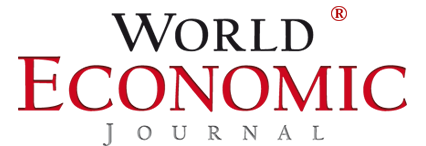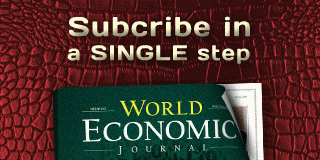“Making a Profit is Not Our Top Priority”
The article is published in: July - August 2012
Waheed Qaiser, the leader of Islamic banking in the UK, is a top international banker who is convinced that global banks need to be making decisions based on the “real” economy. The World Economic Journal’s Editor-in-Chief, Robert Abdullin, and Editor-observer Anastasia Yakoleva sat down to talk to the banker about peaceful existence and his personal optimism in life.
Anastasia Yakovleva (A.Y.): Mr. Qaiser, can you tell us how you first became involved in the business of Islamic banking?
I am a banker by profession, and I find the industry incredibly interesting for the customers and bankers alike. Throughout my career, I’ve worked in several banks – including Citibank NA, IIBU, UBS, HSBC and the Islamic Bank of Britain, – and I am currently in pursuit of establishing a bank in France that will operate on ethical basis once Licensed. As it regards how I became involved in the business of Islamic banking, there came a time in 1997 when I realized that I have an opportunity to focus on real financial needs of the clients on ethical basis and finally had the opportunity to do what I have always wanted to do; provide ethical financial services to customers, so I started my Islamic banking journey in 1997.

Robert Abdullin (R.A.): In your opinion, do many bankers appreciate the benefits of Islamic banking?
Not at the moment, but I would say that the number of those do are increasing every day. Unfortunately, most bankers today focus on what is called the “paper” side of the banking industry or “financial economy”, which is more idealistic and does not necessarily coincide with the “real” economy, leading to huge problems. In fact, careless approaches led to the 2008 crisis and we are still suffering from its damaging after-affects. I feel the time has come that the major banks need to move to the system of “real economy”, so that we could have sustainable economic system around the Globe without any further disastrous hick-ups.
I try to convince people that they have to apply their own reasonable logic in the financial affairs, and convince them to embrace the concept of real economy so that we can avoid repeating the mistakes of the past. They should always challenge their bankers in order to ensure that they fully understand the risk and rewards from the right perspective or seek additional help from the independent advisors who are always handy & supposed to provide assistance and guidance.
A.Y.: Can you explain what steps to take to make sure customers don’t put their financial assets at risk?
The first thing is to explain how the financial system works and the basics of financial planning, as well as what options are available to them today considering their status and risk appetite. The most important thing is attention to details and understanding the risk. Do not blindly follow the others as you don’t know their personal circumstances and the level of financial education they have. Each person’s circumstances are different so one can only provide the appropriate suggestion until you know precisely the sophisticated customers’ circumstances.
A.Y.: But the main goal for your company is still making a profit, is it not?
Actually, making a profit is not our top priority and moreover making reasonable profit is the main motivating factor of any organizations’ efforts. Our main goal is to reach out to people and try & help them as appropriate. If we come across a particular project with a fair amount of risk involved, we point it out to people and explain what steps they need to take to avoid potential troubles. When we first started working in the Islamic banking industry, we were offered a lot of projects which we ultimately declined as we did not feel they offered the right opportunities for our contact base. To get to where we are today, we had to do a lot in terms of education and disseminating the knowledge of Islamic banking to our clients and the market at large. We were lucky to have the receptive and considerate ears in UK and The Government was eager to provide the level playing field to Islamic finance.
A.Y.: Is changing the Constitution even possible?
When we offered Islamic mortgages as a program we faced various challenges. One of the major challenges was double stamp duty. We established Bank of England working party to abolish the double stamp duty in order to have the level playing field for those who wanted to take the route of Islamic mortgages for buying a house. Well, it was a very lengthy process but with the help of partners from different banks and the former Governor of the BOE, it took us three years, during which we had to convince the Government that levying the double stamp duty on Islamic mortgage is unfair. A constitutional amendment was brought-in 2003 that was a great relief to all the users and promoters of Islamic finance. This action of UK authorities was greatly appreciated by the market.
R.A.: And how would you assess the development of Islamic banking throughout Europe today?
UK is the Centre of Islamic finance in any Western economy. Today we have five Islamic banks in UK and I would expect to see much rapid growth emanating from UK as against other European jurisdictions unless the others take similar initiatives as UK did. Luxembourg has shown interest and commitment to Islamic finance. The Islamic banking is fast growing in all sectors of banking. Unfortunately the base is still very thin and hence even the reported growth of 20% for over a decade has not made a real difference in the market place. France has the largest Muslim population but we don’t have a single Islamic bank. Germany is 2nd in terms of Muslim population in Europe but no Islamic bank exists there either. German regulator has been quite keen to promote and support the Islamic banking in Germany. French regulators are quite keen in their public speeches as well. So overall the prospects of Islamic banking in Europe are pretty bright.
R.A.: You talk about constructive and productive trading activity. But if we focus on building new plants and factories, won’t the market supply overtake demand? That could lead to global oversupply and overproduction.
The whole situation would have to be monitored very carefully. What I am suggesting is that Islamic bank invests and promotes a constructive and productive trading activity which is undertaken/financed against specific market need and hence it does not create a market over-supply situation. Nowadays, everyone chooses to buy any product they like, which leads to a lot of competition in almost every industry. But if the businesses that are competing with each other flood the market with oversupply then , the businesses have to search for new markets, improve on their quality to beat the competition, otherwise businesses would be forced to reduce prices and become more competitive to attract customers. Of course, that is very good for the consumers, but not quite as good for producers. So oversupply is a definite potential in certain remote cases, and, should that occur, the businesses would adjust to the market demand to avoid overproduction/oversupply.
R.A.: Do you think that the crisis gives us a chance to balance the global situation?
The crisis can only end positively if people learn to find the positive side of it and not repeat the mistakes of the past.
A.Y.: What about your personal life? Do you look for the positive in everything?
As a human being, I love every person living on our planet. I was brought up with that philosophy, by my parents and my religion, and I agree with it one hundred percent. People who think badly of other people and who don’t believe in others’ rights do not achieve anything in life, and they do not deserve respect. Personally, I am happiest when I can bring a smile to another person’s face. I like to think that I am a very humane person, and I genuinely love helping people.
A.Y.: Do you help them financially as well?
Yes, I try within my means. I like honest and beautiful people, and I try to help orphans or those who experience difficulties in life.

A.Y.: What does money mean to you?
For me, money is a medium of exchange and nothing more. People nowadays pay too much attention to money. You cannot make more money by simply creating more bills – some believe that the more money they print, the better, but the opposite is actually true, because it would inevitably lead to inflation without real production or corresponding constructive trading activity. Today, many people are obsessed with money. Money has a limited function in our lives and it certainly does not conduce to happiness.
R.A.: A person’s attitude to the world is often formed based on experience with people from different countries and from traveling, is it not?
Well, that is partially true. I love traveling, and I especially love visiting Dubai! I started my banking career there, and I watched the city develop into a modern fairytale. I definitely have a very positive impression. In general, my philosophy is that it depends on all of us, how we behave and position ourselves, and our attitude towards others. I pray that May peace and love prevail and we begin to treat each other the way we like to be treated.
There are no comments yet. Why don’t you leave your own comment?
It is not possible to make a comment anonymously. Please . It is very simple. |
|














